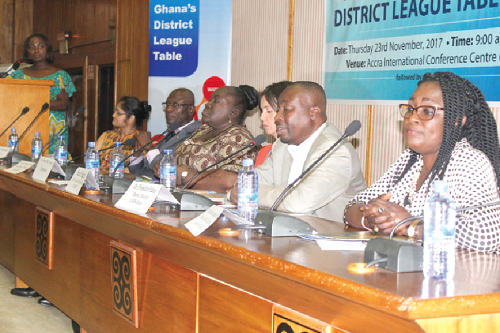
Tema Metropolis Tops 2017 District League Table
The Tema Metropolitan Assembly (TMA) has been ranked first in the 2017 District League Table (DLT).The TMA had the highest score of 80 on the
development and human well-being ranking of the DLT.
At the launch of the rankings in Accra last Wednesday, a deputy Minister of Local Government and Rural Development, Mr Kwesi Boateng Adjei, said the impressive showing of Tema was predictable.
That was because the metropolis had used some innovative ways to increase its revenue generation.
The minister noted that since the launch of the maiden DLT in 2014, some districts had improved upon their scores, while others had declined over the period.
That, according to him, gives an indication that there is more work to be done by all Ghanaians.
DLT
The DLT is a development tool that ranks all 216 districts in the country according to some basic indicators critical to development.
It was developed by the United Nations Children’s Fund (UNICEF) and the Centre for Democratic Development (CDD-Ghana).
It is produced annually with the support of the Ministry of Local Government and Rural Development (MLGRD) and the Office of the Head of Local Government Service.
The DLT is based on global standards of index design, including the Human Development Index (HDI).
Six key sectors, education, sanitation, rural water, health, security and governance, receive equal weights in the construction of the index and the districts are ranked based on them.
Stock taking
According to the minister, the launch of the 2017 DLT provided an opportunity for all partners to take stock and analyse the constraints and challenges that the DLT presented, while making progress with its achievements.
He expressed satisfaction with the pre-launch activities in the regions by UNICEF and the CDD-Ghana, in collaboration with his ministry.
Mr Adjei urged the various MMDAs to further engage the citizens to enhance service delivery at their respective areas.
Highlights
Presenting highlights on the rankings for the year, the Chief Policy of UNICEF, Ms Sarah Hague, said Krachi East came last in the rankings.
Generally, the DLT showed an uneven development in districts across the country.
Additionally, progress in development had been marginal, with obvious declines by districts at the bottom.
Nine new districts had risen to the first top 20, while 12 were down in the last bottom 20.
Fifty districts have shown no progress at all for the entire period since the launch of the first DLT.
Outcome
The Deputy Director of CDD, Dr Franklin Oduro, said past releases of the rankings had inspired action but in some cases resulted in anger over positions.
He said information provided in the report could be used to transform development across Ghana.
Dr Oduro also pointed out that a clear distinction needed to be made between what local authorities could be held accountable for and what the central government was supposed to do in terms of service delivery.
“The DLT is a useful tool to inform responses and accountability,” he said.
Agenda
A representative of UNICEF, Ms Rushnan Murtaza, said the DLT was a national initiative to increase accountability for development across the country.
She said the agenda for change, for which reason the DLT had been developed, had been achieved in part but key challenges still persisted.
It includes access to information, effective use of the rankings for better development and inadequate resource allocation in some districts.
The Director of Management and Technical Services at the Office of the Head of Local Government Service, Ing Mabel Amoako-Atta, said the DLT should be seen as a tool to encourage further action from all partners.
A development expert, Dr Mrs Esther Ofei-Aboagye, said the DLT could be used by Regional Coordinating Councils (RCCs) to foster dialogue and action between high and low performing districts in the regions.
